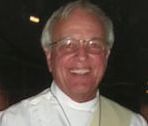“But our citizenship is in heaven, and it is from there that we are expecting a Savior, the Lord Jesus Christ. He will transform our humble bodies that they may be conformed to the body of His glory . .” Philippians 3: 20-21
Paul tells the church in Corinth “A thorn was given me in the flesh . . . Three times I appealed to the Lord about this, that it would leave me, but he said to me, “My grace is sufficient for you, for power is made perfect in weakness.” 2 Corinthians 12: 8-9
I regard as one of the better things I do for the community of Saint Anthony on the Desert is being present in St. Luke’s chapel to be with those who in need of healing seek words of encouragement, of solace. As well as prayers and a sympathetic touch, (“laying on of hands”), which I believe emphasize our mutual and shared brokenness.
Yet, I struggle with this whole idea of healing sickness and disease through prayer. How do our prayers for healing work? I know God and Jesus in his glory hear us! Why do we not perceive their answers? How did I feel when all our prayers to heal Bonnie of her cancer didn’t result in the cancer going away? In my mind, I felt that perhaps her death is a healing; her, and God’s, final victory over the cancer. It was a way to deal with it! Did that help me in my grieving; not much! Nor was it meant to! It was more an intellectual answer rather than a spirit filled answer from my heart.
So, what does this mean to us, “to be healed”? The words salvation and savior are rooted in the Latin salve: to heal, to be made whole, the one who makes us whole.
We say Christ Jesus comes to us and brings God’s salvation. The church, that’s all of us, names Jesus as our Savior. We proclaim Him as Lord and Savior. We are saying, confessing to, and proclaiming that He comes to heal us; to make our broken humanness whole; to strengthen our human weaknesses. In His human nature, he experienced despair, brokenness, pain, death, healing. He knows what is to be fully human, warts and all. Is this where our hope should be? Perhaps the answer I, we, are looking for?
The idea that salvation principally means a “rescue from” something could be considered a negative concept. I don’t believe sending an S. O. S. to God or spelling out HELP in the sand is the answer. Maybe there’s no really satisfactory answer for me, for us. Am I, are we, expecting too much? I don’t know the answer.
But this is not the answer. Expecting to be “rescued from” all the aspects of illness and disease does little in a positive way to ease our hurting souls and sick bodies in need of healing. It sometimes brings doubts in faith and lives full of despair. We hear: “Because of this disease, I’ve lost control over my life!” As if we ever had full control. “Is this sickness punishment for my sins?” “Should I feel guilty that I am the cause?” “If there is no divine intervention, why should I hope? Why should I believe?”
Salvation in a more positive concept God gifts us into a deeper intimacy with Him. God’s loving, salvific acts enable us to better understand that healing is less about our bodies and more about the health of our souls.
The words from St. Paul assure us we share in Christ’s glorified body, here and now; each in our own brokenness. Like his broken body made whole and healed by God’s power, we share in that healing power as well. It is the promise of God’s Spirit dwelling within us.
Our response to that promise is to accept that in our sufferings we are participants in Christ’s life; to know in our hearts, in the midst of our pain, with a certainty, that God never withdraws from us, never abandons us. We are in Christ, and he is in us. In this oneness with Christ, we begin to see how our sickness and pain are consecrated to our total life in Christ. We know that Jesus suffered and died in agonizing, excruciating pain. We share in that suffering. We share in that pain.
Are we now encountering one of the great mysteries of our faith? The mystery that somehow (a theologian’s favorite word) there is Devine healing happening always? Are we in our human inability to really know God’s true nature getting into the unknowable, the ineffable mysteries of our faith?
Maybe we are. All we can do is rest with confidence and hope in God’s gift of intimacy and grace.
I see no clear answer in my struggle about healing prayer except in the reality of God’s steadfast love and mercy; in God’s compassion for His children.
And in: “My grace is sufficient for you.”
Paul tells the church in Corinth “A thorn was given me in the flesh . . . Three times I appealed to the Lord about this, that it would leave me, but he said to me, “My grace is sufficient for you, for power is made perfect in weakness.” 2 Corinthians 12: 8-9
I regard as one of the better things I do for the community of Saint Anthony on the Desert is being present in St. Luke’s chapel to be with those who in need of healing seek words of encouragement, of solace. As well as prayers and a sympathetic touch, (“laying on of hands”), which I believe emphasize our mutual and shared brokenness.
Yet, I struggle with this whole idea of healing sickness and disease through prayer. How do our prayers for healing work? I know God and Jesus in his glory hear us! Why do we not perceive their answers? How did I feel when all our prayers to heal Bonnie of her cancer didn’t result in the cancer going away? In my mind, I felt that perhaps her death is a healing; her, and God’s, final victory over the cancer. It was a way to deal with it! Did that help me in my grieving; not much! Nor was it meant to! It was more an intellectual answer rather than a spirit filled answer from my heart.
So, what does this mean to us, “to be healed”? The words salvation and savior are rooted in the Latin salve: to heal, to be made whole, the one who makes us whole.
We say Christ Jesus comes to us and brings God’s salvation. The church, that’s all of us, names Jesus as our Savior. We proclaim Him as Lord and Savior. We are saying, confessing to, and proclaiming that He comes to heal us; to make our broken humanness whole; to strengthen our human weaknesses. In His human nature, he experienced despair, brokenness, pain, death, healing. He knows what is to be fully human, warts and all. Is this where our hope should be? Perhaps the answer I, we, are looking for?
The idea that salvation principally means a “rescue from” something could be considered a negative concept. I don’t believe sending an S. O. S. to God or spelling out HELP in the sand is the answer. Maybe there’s no really satisfactory answer for me, for us. Am I, are we, expecting too much? I don’t know the answer.
But this is not the answer. Expecting to be “rescued from” all the aspects of illness and disease does little in a positive way to ease our hurting souls and sick bodies in need of healing. It sometimes brings doubts in faith and lives full of despair. We hear: “Because of this disease, I’ve lost control over my life!” As if we ever had full control. “Is this sickness punishment for my sins?” “Should I feel guilty that I am the cause?” “If there is no divine intervention, why should I hope? Why should I believe?”
Salvation in a more positive concept God gifts us into a deeper intimacy with Him. God’s loving, salvific acts enable us to better understand that healing is less about our bodies and more about the health of our souls.
The words from St. Paul assure us we share in Christ’s glorified body, here and now; each in our own brokenness. Like his broken body made whole and healed by God’s power, we share in that healing power as well. It is the promise of God’s Spirit dwelling within us.
Our response to that promise is to accept that in our sufferings we are participants in Christ’s life; to know in our hearts, in the midst of our pain, with a certainty, that God never withdraws from us, never abandons us. We are in Christ, and he is in us. In this oneness with Christ, we begin to see how our sickness and pain are consecrated to our total life in Christ. We know that Jesus suffered and died in agonizing, excruciating pain. We share in that suffering. We share in that pain.
Are we now encountering one of the great mysteries of our faith? The mystery that somehow (a theologian’s favorite word) there is Devine healing happening always? Are we in our human inability to really know God’s true nature getting into the unknowable, the ineffable mysteries of our faith?
Maybe we are. All we can do is rest with confidence and hope in God’s gift of intimacy and grace.
I see no clear answer in my struggle about healing prayer except in the reality of God’s steadfast love and mercy; in God’s compassion for His children.
And in: “My grace is sufficient for you.”


 RSS Feed
RSS Feed